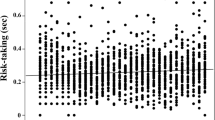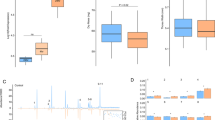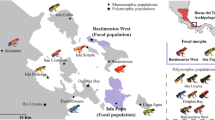Abstract
Intense male competition for access to females has often led to the evolution of alternative reproductive tactics (ARTs) such as sneaking, female mimicking, and satellite behavior. In many cases, which tactic a male expresses will depend upon intrinsic condition and/or environmental factors. Parental effects are also expected to play a critical role in ART expression when the parental environment is predictive of the offspring environment. Such parental effects on ARTs have remained largely unexplored. Here, we investigated maternal effects associated with operational sex ratio (OSR) on male ARTs (fighter and sneaker) in two-spotted spider mites Tetranychus urticae. In this mite species, mothers can anticipate the future male competition intensity (the future OSR) based upon the present OSR. To adjust local mate competition (LMC) among sons, mothers produce proportionally more sons under female-biased OSR and vice versa. We manipulated the maternal OSR and found that changes in maternal OSR did not alter the sneaker: fighter ratio among sons, but sneaker sons from mothers that experienced female-biased OSR started to guard females more quickly. Sneakers stay motionless on the dorsum of molting females, which is an advantageous position for mating with the emerging adult, and appear to deceive rival fighter males because they are not challenged. Earlier guarding by sneakers is advantageous for securing matings under intense male competition—as would be anticipated from the female-biased maternal OSR. We conclude that mothers anticipate the level of male competition in the next generation and influence their sons’ mating behavior accordingly.
Significance statement
In response to intense male competition for access to females, males often evolve alternative reproductive tactics (ARTs) such as sneaking behavior. Parental effects are widespread and expected to play an important role in the determination of offspring’s ARTs when the parental environment is predictive of the offspring environment. We focus on operational sex ratio (OSR) as a predictor of male competition intensity in the next generation and found that female-biased OSR in the parental generation induces earlier guarding by sneaker sons in two-spotted spider mites. Mothers produce proportionally more sons under female-biased OSR, resulting in intense male competition in the next generation, and improve the odds of early guarding sneakers. Overall, our study suggests that spider mite mothers adjust their sons’ mating behavior by anticipating the intensity of male competition in the next generation from the present OSR.



Similar content being viewed by others
Data availability
The raw data underlying the presented experiments are provided as supplementary material.
References
Andersson M (1994) Sexual selection. Princeton University Press, Princeton, N.J
Badyaev AV, Uller T (2009) Parental effects in ecology and evolution: mechanisms, processes and implications. Philos Trans R Soc Lond Ser B Biol Sci 364:1169–1177. https://doi.org/10.1098/rstb.2008.0302
Boudreaux HB (1963) Biological aspects of some phytophagous mites. Annu Rev Entomol 8:137–154. https://doi.org/10.1146/annurev.en.08.010163.001033
Brockmann HJ (2001) The evolution of alternative strategies and tactics. In: Naguib M, Mitani CJ, Simmons WL et al (eds) Advances in the study of behavior. Academic Press, pp 1–51
Brockmann HJ, Penn D (1992) Male mating tactics in the horseshoe crab, Limulus polyphemus. Anim Behav 44:653–665
Brooks ME, Kristensen K, Koen JB, Magnusson A, Berg CW, Nielsen A, Skaug HJ, Mächler M, Bolker BM (2017) glmmTMB balances speed and flexibility among packages for zero-inflated generalized linear mixed modeling. The R Journal 9:378–400
Buzatto BA, Tomkins JL, Simmons LW (2012) Maternal effects on male weaponry: female dung beetles produce major sons with longer horns when they perceive higher population density. BMC Evol Biol 12:118. https://doi.org/10.1186/1471-2148-12-118
Candolin U, Vlieger L (2013) Should attractive males sneak: the trade-off between current and future offspring. PLoS One 8:e57992
Collins RD, Margolies DC (1994) The effect of interspecific mating on sex ratios in the twospotted spider mite and the Banks grass mite (Acarina: Tetranychidae). J Insect Behav 8:189–206. https://doi.org/10.1007/BF01988904
Cone WW, McDonough LM, Maitlen JC, Burdajewicz S (1971) Pheromone studies of the two spotted spider mite. 1. Evidence of a sex pheromone. J Econ Entomol 64:355–358. https://doi.org/10.1093/jee/64.2.355
Emlen DJ (1994) Environmental control of horn length dimorphism in the beetle Onthophagus acuminatus (Coleoptera: Scarabaeidae). Proc R Soc B 256:131–136. https://doi.org/10.1098/rspb.1994.0060
Emlen DJ (1997) Alternative reproductive tactics and male-dimorphism in the horned beetle Onthophagus acuminatus (Coleoptera: Scarabaeidae). Behav Ecol Sociobiol 41:335–341. https://doi.org/10.1007/s002650050393
Emlen DJ (2008) The evolution of animal weapons. Annu Rev Ecol Evol Syst 39:387–413. https://doi.org/10.1146/annurev.ecolsys.39.110707.173502
Enders MM (1993) The effect of male size and operational sex ratio on male mating success in the common spider mite, Tetranychus urticae Koch (Acari: Tetranychidae). Anim Behav 46:835–846
Gross MR (1996) Alternative reproductive strategies and tactics: diversity within sexes. Trends Ecol Evol 11:92–98. https://doi.org/10.1016/0169-5347(96)81050-0
Guang-Yun L, Zhi-Qiang Z (2021) Sex dimorphism of life-history traits and their response to environmental factors in spider mites. Exp Appl Acarol 84:497–527. https://doi.org/10.1007/s10493-021-00632-4
Hamilton WD (1967) Extraordinary sex ratios. Science 156:477–488. https://doi.org/10.1126/science.156.3774.477
Heckel G, von Helversen O (2002) Male tactics and reproductive success in the harem polygynous bat Saccopteryx bilineata. Behav Ecol 13:750–756
Helle W (1967) Fertilization in the two-spotted spider mite (Tetranychus urticae: Acari). Entomol Exp Appl 10:103–110. https://doi.org/10.1111/j.1570-7458.1967.tb00049.x
Helle W, Sabelis MW (1985) Spider mites: their biology, natural enemies and control, vol 1A. Elsevier
Hunt J, Simmons LW (2000) Maternal and paternal effects on offspring phenotype in the dung beetle Onthophagus taurus. Evolution 54:936–941. https://doi.org/10.1111/j.0014-3820.2000.tb00093.x
Hussey NW, Parr WJ (1963) Dispersal of the glasshouse red spider mite Tetranychus urticae Koch (Acarina, Tetranychidae). Entomol Exp Appl 6:207–214. https://doi.org/10.1111/j.1570-7458.1963.tb00619.x
Jirotkul M (1999) Operational sex ratio influences female preference and male–male competition in guppies. Anim Behav 58:287–294. https://doi.org/10.1006/anbe.1999.1149
Kvarnemo C, Ahnesjö I (1996) The dynamics of operational sex ratios and competition for mates. Trends Ecol Evol 11:404–408. https://doi.org/10.1016/0169-5347(96)10056-2
Macke E, Magalhães S, Bach F, Olivieri I (2011) Experimental evolution of reduced sex ratio adjustment under local mate competition. Science 334:1127–1129. https://doi.org/10.1126/science.1212177
Macke E, Magalhães S, Bach F, Olivieri I (2012) Sex-ratio adjustment in response to local mate competition is achieved through an alteration of egg size in a haplodiploid spider mite. Proc R Soc B 279:4634–4642. https://doi.org/10.1098/rspb.2012.1598
Margolies DC, Collins RD (1994) Chemically-mediated pre-mating behavior in two tetranychid species. Exp Appl Acarol 18:493–501. https://doi.org/10.1007/BF00051471
Mills SC, Reynolds JD (2003) Operational sex ratio and alternative reproductive behaviours in the European bitterling, Rhodeus sericeus. Behav Ecol Sociobiol 54:98–104. https://doi.org/10.1007/s00265-003-0616-1
Moczek AP, Emlen DJ (2000) Male horn dimorphism in the scarab beetle, Onthophagus taurus: do alternative reproductive tactics favour alternative phenotypes? Anim Behav 59:459–466. https://doi.org/10.1006/anbe.1999.1342
Mousseau TA, Uller T, Wapstra E, Badyaev AV (2009) Evolution of maternal effects: past and present. Philos Trans R Soc B 364:1035–1038. https://doi.org/10.1098/rstb.2008.0303
Navajas M, Tsagkarakov A, Lagnel J, Perrot-Minnot M-J (2000) Genetic differentiation in Tetranychus urticae (Acari: Tetranychidae): polymorphism, host races or sibling species? Exp Appl Acarol 24:365–376. https://doi.org/10.1023/A:1006432604611
Oberpriller J, de Souzal LM, Pichler M (2022) Fixed or random? On the reliability of mixed-effects models for a small number of levels in grouping variables. Ecol Evol 12:e9062
Oku K (2009) Males of the two-spotted spider mite attempt to copulate with mated females: effects of double mating on fitness of either sex. Exp Appl Acarol 50:107. https://doi.org/10.1007/s10493-009-9306-7
Oku K, Weldegergis BT, Poelman EH et al (2015) Altered volatile profile associated with precopulatory mate guarding attracts spider mite males. J Chem Ecol 41:187–193. https://doi.org/10.1007/s10886-015-0547-0
Oliveira RF, Taborsky M, Brockmann JH (2008) Alternative reproductive tactics: an integrative approach. Cambridge University Press, Cambridge
Pienaar J, Greeff JM (2003) Maternal control of offspring sex and male morphology in the Otitesella fig wasps. J Evol Biol 16:244–253. https://doi.org/10.1046/j.1420-9101.2003.00522.x
Potter DA, Wrensch DL, Johnston DE (1976) Aggression and mating success in male spider mites. Science 193:160–161. https://doi.org/10.1126/science.193.4248.160
R Core Team (2020) R: a language and environment for statistical computing. Foundation for Statistical Computing, Vienna
Rasmy AH, Hussein HE (1994) Effect of age and mating on release of female sex pheromones and male response in the two-spotted spider mite. J Appl Entomol 117:109–111. https://doi.org/10.1111/j.1439-0418.1994.tb00714.x
Rodrigues LR, Figueiredo ART, van Leeuwen T et al (2020) Costs and benefits of multiple mating in a species with first-male sperm precedence. J Anim Ecol 89:1045–1054. https://doi.org/10.1111/1365-2656.13171
Rodrigues LR, Figueiredo ART, Varela SAM et al (2017) Male spider mites use chemical cues, but not the female mating interval, to choose between mates. Exp Appl Acarol 71:1–13. https://doi.org/10.1007/s10493-016-0103-9
Roeder C, Harmsen R, Mouldey S (1996) The effects of relatedness on progeny sex ratio in spider mites. J Evol Biol 9:143–151. https://doi.org/10.1046/j.1420-9101.1996.9020143.x
Roeder CM (1992) Sex ratio response of the two-spotted spider mite (Tetranychus urticae Koch) to changes in density under local mate competition. Can J Zool 70:1965–1967. https://doi.org/10.1139/z92-266
Royalty RN, Phelan PL, Hall FR (1992) Arrestment of male twospotted spider mite caused by female sex pheromone. J Chem Ecol 18:137–153. https://doi.org/10.1007/BF00993749
Royalty RN, Phelan PL, Hall FR (1993a) Quantitative and temporal analysis of effects of twospotted spider mite (Acari: Tetranychidae) female sex pheromone on male guarding behavior. J Chem Ecol 19:211–223. https://doi.org/10.1007/BF00993690
Royalty RN, Phelan PL, Hall FR (1993b) Comparative effects of form, colour, and pheromone of twospotted spider mite quiescent deutonymphs on male guarding behaviour. Physiol Entomol 18:303–316. https://doi.org/10.1111/j.1365-3032.1993.tb00603.x
Sato Y, Alba JM (2020) Reproductive interference and sensitivity to female pheromones in males and females of two herbivorous mite species. Exp Appl Acarol 81:59–74. https://doi.org/10.1007/s10493-020-00492-4
Sato Y, Alba JM, Sabelis MW (2014a) Testing for reproductive interference in the population dynamics of two congeneric species of herbivorous mites. Heredity 113:495–502. https://doi.org/10.1038/hdy.2014.53
Sato Y, Rühr PT, Schmitz H et al (2016) Age-dependent male mating tactics in a spider mite—a life-history perspective. Ecol Evol 6:7367–7374. https://doi.org/10.1002/ece3.2489
Sato Y, Sabelis MW, Egas M (2014b) Alternative male mating behaviour in the two-spotted spider mite: dependence on age and density. Anim Behav 92:125–131. https://doi.org/10.1016/j.anbehav.2014.03.032
Sato Y, Sabelis MW, Egas M, Faraji F (2013) Alternative phenotypes of male mating behaviour in the two-spotted spider mite. Exp Appl Acarol 61:31–41. https://doi.org/10.1007/s10493-013-9673-y
Satoh Y, Yano S, Takafuji A (2001) Mating strategy of spider mite, Tetranychus urticae (Acari: Tetranychidae) males: postcopulatory guarding to assure paternity. Appl Entomol Zool 36:41–45. https://doi.org/10.1303/aez.2001.41
Schausberger P, Gotoh T, Sato Y (2019) Spider mite mothers adjust reproduction and sons’ alternative reproductive tactics to immigrating alien conspecifics. R Soc Open Sci 6:191201. https://doi.org/10.1098/rsos.191201
Schausberger P, Rendon D (2022) Transgenerational effects of grandparental and parental diets combine with early-life learning to shape adaptive foraging phenotypes in Amblyseius swirskii. Commun Biol 5:1–10. https://doi.org/10.1038/s42003-022-03200-7
Schausberger P, Sato Y (2019) Parental effects of male alternative reproductive tactics (ARTs) on ARTs of haploid sons. Funct Ecol 33:1684–1694. https://doi.org/10.1111/1365-2435.13385
Schausberger P, Sato Y (2020) Kin-mediated male choice and alternative reproductive tactics in spider mites. Biology 9:360. https://doi.org/10.3390/biology9110360
Silk MJ, Harrison XA, Hodgson DJ (2020) Perils and pitfalls of mixed-effects regression models in biology. PeerJ 8:e9522. https://doi.org/10.7717/peerj.9522
Smallegange IM (2011) Effects of paternal phenotype and environmental variability on age and size at maturity in a male dimorphic mite. Naturwissenschaften 98:339–346. https://doi.org/10.1007/s00114-011-0773-4
Theneau TM (2020) coxme: mixed effects Cox models. R package version 2. 2-16. https://CRAN.R-project.org/package=coxme
Thornhill R, Alcock J (1983) The evolution of insects mating systems. Harvard University Press, Cambridge
Trivers RL, Wikkard DE (1973) Natural selection of parental ability to vary the sex ratio of offspring. Science 179:90–92
Wackers S, Mobley K, Forsgren E et al (2013) Operational sex ratio but not density affects sexual selection in a fish. Evolution 67:1937–1949. https://doi.org/10.1111/evo.12092
Weatherhead PJ, Boag BT (1995) Pair and extra-pair mating success relative to male quality in red-winged blackbirds. Behav Rcol Sociobiol 37:81–97
Young SSY, Wrensch DL, Kongchuensin M (1986) Control of sex ratio by female spider mites. Entomol Exp Appl 40:53–60. https://doi.org/10.1111/j.1570-7458.1986.tb02155.x
Acknowledgements
We thank Drs. Merijn Kant and Juan M. Alba for their kind supports for the colony of T. urticae used in this study. We thank the staff in Sugadaira Research Station for their help with our activity in the station.
Funding
This study was financially supported by the Japan Society for the Promotion of Science (JSPS) (invitation fellowship L18534 to PS and YS, and KAKENHI grants 17K07556 and 20K06810 to YS).
Author information
Authors and Affiliations
Contributions
All authors contributed to the study conception and design and result interpretation. YS and PS took care of the organisms and performed the experiments. YS conducted the statistical analyses. YS wrote the first draft of the manuscript; ME and PS contributed to writing. All authors read and approved the final manuscript.
Corresponding author
Ethics declarations
Ethic approval
Not applicable.
Consent to participate
Not applicable.
Consent for publication
All authors agree to publish this paper.
Conflict of interest
The authors declare no competing interests.
Additional information
Communicated by D. Kemp
Publisher’s note
Springer Nature remains neutral with regard to jurisdictional claims in published maps and institutional affiliations.
Supplementary information
ESM 1
(XLSX 114 kb)
Rights and permissions
Springer Nature or its licensor (e.g. a society or other partner) holds exclusive rights to this article under a publishing agreement with the author(s) or other rightsholder(s); author self-archiving of the accepted manuscript version of this article is solely governed by the terms of such publishing agreement and applicable law.
About this article
Cite this article
Sato, Y., Egas, M. & Schausberger, P. The operational sex ratio experienced by mothers modulates the expression of sons’ alternative reproductive tactics in spider mites. Behav Ecol Sociobiol 77, 95 (2023). https://doi.org/10.1007/s00265-023-03370-2
Received:
Revised:
Accepted:
Published:
DOI: https://doi.org/10.1007/s00265-023-03370-2




